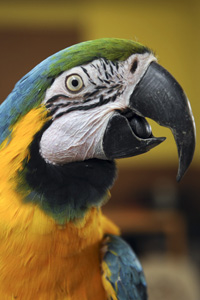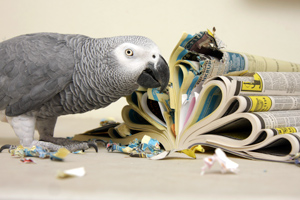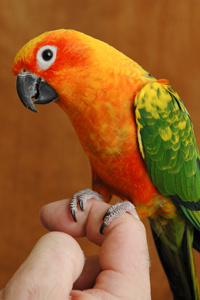The world of parrots
 This week we are celebrating Parrot Week at Best Friends Animal Society! The Parrot Garden is one of the Sanctuary’s most raucous and joyous areas. Wolf whistles abound, and you will often find caregivers dancing and singing with their charges. You cannot be afraid of looking foolish when you are entertaining parrots! So if you are planning on visiting us, leave your inhibitions behind.
This week we are celebrating Parrot Week at Best Friends Animal Society! The Parrot Garden is one of the Sanctuary’s most raucous and joyous areas. Wolf whistles abound, and you will often find caregivers dancing and singing with their charges. You cannot be afraid of looking foolish when you are entertaining parrots! So if you are planning on visiting us, leave your inhibitions behind.
Parrots have become the third most popular companion animal, just behind dogs and cats. Experts say the number of owned parrots, including cockatoos and macaws, soared 417 percent in the last 20 years from 11.6 million in 1990, to 40 million in 2006, and to 60 million in 2010. There could be as many as 100 million captive parrots by 2020, Best Friends experts predict. With a life expectancy of between 20 and 80 years, depending on species, it is easy to see how the numbers will just continue to grow.
Birds come to the Parrot Garden for many different reasons. It used to be that we saw many birds who had major behavioral issues, but recently we are seeing birds who have lived in one home for decades. It is a sad fact of life that in most situations, a parrot will outlive his human caregivers. It is estimated that most parrots live in seven to 11 homes during their lifetime.
A perfect example of this is Casey (pictured above) the blue and gold macaw. Casey lived with a family for 17 years. He was a beloved family member and did everything with them. His world turned upside down when both of his caregivers died and he went to live with their son and his fiancé. Unfortunately, the son was extremely allergic to Casey’s dander and most of his care fell to the fiancé. Since they were both aware that they were not meeting Casey’s emotional needs, they contacted Best Friends. Casey eventually was admitted into the Parrot Garden, where he is waiting to meet that special person who will take him home and make him part of a family again. You can check out many of our adoptable parrots by clicking here! 
The staff at the Parrot Garden is devoted to the birds in our care. We have learned a lot about these creatures in the years we have cared for them. When I visited with staff about the things they wished everyone knew about parrots, they came up with a list of five things that they wanted to share.
- Parrots are not domesticated animals. One of the primary characteristics of parrots is that they are wild animals. They are only a couple of generations removed from the wild. And as such, they retain all the characteristics of a wild bird. In their natural environment, they are loud, destructive and messy. In your living room, they are also loud, destructive and messy!The companion animals we are most familiar with, dogs and cats, are predators and have been domesticated for thousands of years. Parrots are a prey species and have survival instincts that are unfamiliar to most people. It is natural for parrots to “sound off” every day at dawn and dusk. In the wild, that calls the flock together and makes sure everyone is alright. In an apartment, it can be a cause for great friction with your neighbors. A friendly dog or cat is usually friendly with all humans. A parrot will make an instant determination whether a person belongs in their flock or not, and will react accordingly. So a bird that is wonderful for one person will have absolutely nothing to do with someone else.
- Parrots should not be fed a diet of bird seed. Parrots are generally healthy, but one major health issue we’ve seen repeatedly is liver damage due to bird seed diets. Bird seed is high in fat and low in most nutrients. Birds in the wild need the fat found in seeds to fuel them as they are flying and foraging for most of the day. But birds in a cage cannot handle these empty calories without suffering health problems, such as fatty liver disease. The Parrot Garden helps ensure the health of our birds by feeding a pelleted diet and plenty of fresh vegetables.
- Most birds sold in pet stores are the product of bird mills. Just like the puppy mills we are all familiar with, bird mills exist to pump high numbers of birds into the economy. Bird mills do not see parrots as the unique, highly intelligent individuals they are. Instead, parrots are viewed as products or commodities and they are treated as such. The birds receive no socialization or enrichment. They exist in a bare cage with a perch and a nest box. It is no wonder that so many breeder birds have feather-destructive behavior. The best way to end the torment of birds living in bird mills is to not purchase birds from pet stores. Every time we purchase a bird, it perpetuates the horrendous existence of the parent birds, trapped in a half life in someone’s basement or shed.

- The myth of the handfed baby. Bird breeders assert that the best way to have a loving and bonded companion bird is to purchase an unweaned baby parrot and hand-feed it. They say that a handfed baby will love you as its parent and will grow up to be the best possible companion. In actuality, a baby parrot who has been pulled from the nest suffers from parental deprivation. In the wild, a young parrot stays with his parents for up to two years, learning the skills to survive, mate and raise young. Studies show that parrots continue to feed their young, long after they have left the nest. A baby parrot who is removed from the care of his parents immediately after hatching never gets a chance to learn the skill sets he needs to be a healthy, happy, curious and confident companion. Because he has never learned how to be a bird, he is actually more likely to develop problematic behaviors, such as biting, screaming and feather-destructive behavior (a condition unknown in the wild but all too common in captivity).
- Parrots need to have an enriching environment. Studies have shown us that parrots have intelligence equal to a 5-year-old human child and the emotional development of a 2 year old. Due to this high degree of intelligence, it is critical that we supply captive birds with toys and other enrichment activities. In the wild, a bird spends the majority of his day foraging for food. However, we place birds in a cage and give them all of their food in a bowl. It’s no wonder many parrots develop behavior issues. We subject them to what amounts to solitary confinement in a small cell with nothing to do. There are many inexpensive things you can do to improve the life of your feathered companion. We have many resources available here at the Parrot Garden, and the Web abounds with enrichment activities. You can also find great pet care tips for your parrot in the Best Friends Resource Library under You and Your Bird.
A relationship with a companion bird can be an intensely rewarding experience. Their intelligence, natural humor and ability to bond with humans can be surprising. We would love the opportunity to introduce people to the winged marvels that populate the Parrot Garden. But remember, leave your inhibitions behind. The birds expect you to sing and dance with them!
And don't forget you can check out Parrot Week on the Best Friends website and get a gander at what all the squawking is about from the safety of your own home!
